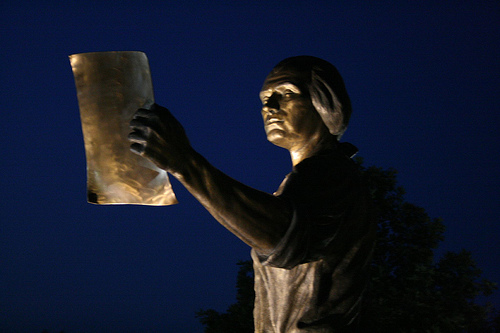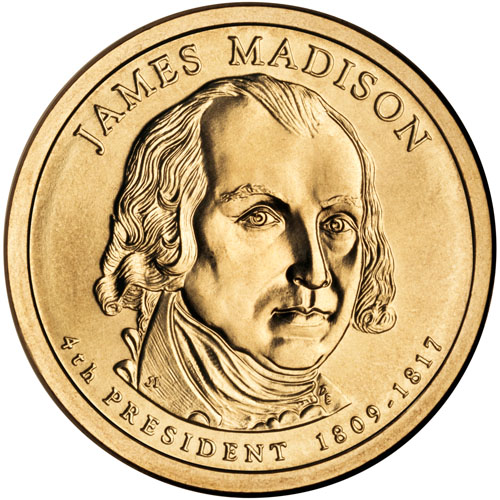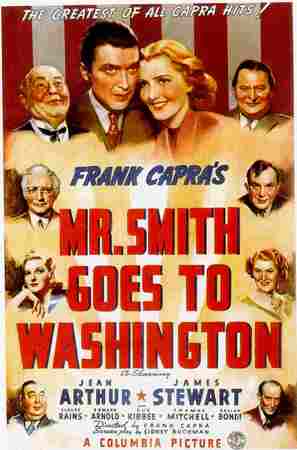If you were a late 18th-century resident of New York reading the Federalist Papers for the first time, I think there's a small-but-not-insignificant chance you'd only be a few pages into Federalist No. 2 before you started wondering if "Publius" -- the supposed author of these papers -- is a touch bipolar. Behind the scenes, of course,
"bad cop" Alexander Hamilton has turned over the writing duties to "good cop" John Jay. The shift in tone is abrupt, even if the goal is the same.
Still, if Detective Hamilton looks bad because he's bringing rubber hoses and lead pipes into the interrogation room, we can't let Jay off the hook too lightly. Because his job here is to make the case that -- despite what opponents of the proposed Constitution tell you -- it's important that the United States actually remain
united states. So Federalists No. 2 through 5 are all about the wisdom of sticking together. Unless I'm missing something, though, Jay is arguing against strawmen.
It is well worthy of consideration therefore, whether it would conduce more to the interest of the people of America that they should, to all general purposes, be one nation, under one federal government, or that they should divide themselves into separate confederacies, and give to the head of each the same kind of powers which they are advised to place in one national government.
And later:
With what propriety, therefore, or for what good purposes, are attempts at this particular period made by some men to depreciate the importance of the Union? Or why is it suggested that three or four confederacies would be better than one?
Yeah! Why do those guys want to break us all up?
Wait a minute. Which guys are those?
Damned if I know. Remember: I'm not an academic. I've got what I think is a decent knowledge of American history, but I can't remember the names of anybody who suggested -- at this point in time -- that America would be better off breaking into pieces. A quick Google search does me no good. I even download a copy of "
The Anti-Federalist Papers," hoping to find an example. But what I find, skimming through chapter headings, are a series of other objections: the Constitution's lack of a Bill of Rights (it would later be added), along with a whole host of what might now be called "big government" concerns about taxes and tyranny. What I don't find, though, is a "let's call the whole thing off" attitude about the Union.
Skimming through the Antifederalists, in fact, what's striking is that they -- like the Federalists -- believe the Articles of Confederation (basically: the constitution before the Constitution) are broken. They just think the proposed Constitution isn't necessarily the right solution. Here's "Centinel," writing in Antifederalist No. 21:
That the present confederation is inadequate to the objects of the union, seems to be universally allowed. The only question is, what additional powers are wanting to give due energy to the federal government?
Well, that seems to be a fair question, doesn't it? Even an enduring one.
But we're moving into Federalist No. 3 now, and Jay finally sets himself to the task of answering his strawman question: Union (unh!): What is it good for?
Safety, basically.
Thirteen separate states, he says, will have 13 different ways to give offense to the wider world, increasing their chances of stumbling into war. A unified nation is less likely to go to war over, say, border problems than a border state itself would. Jay doesn't really explain, though, why Massachusetts should care if (say) Virginia goes to war. He's assuming the attachment to Union, I think, because he knows he's already got it -- he knows he's arguing against strawmen.
There's also safety -- and quality -- in numbers. Bigger city high schools usually have better basketball teams than small towns because they have a bigger talent pools to draw from; Jay figures the same thing. Jay starts this case in No. 3, and continues making it in No. 4.
One government can collect and avail itself of the talents and experience of the ablest men, in whatever part of the Union they may be found. It can move on uniform principles of policy. It can harmonize, assimilate, and protect the several parts and members, and extend the benefit of its foresight and precautions to each. In the formation of treaties, it will regard the interest of the whole, and the particular interests of the parts as connected with that of the whole. It can apply the resources and power of the whole to the defense of any particular part, and that more easily and expeditiously than State governments or separate confederacies can possibly do, for want of concert and unity of system. It can place the militia under one plan of discipline, and, by putting their officers in a proper line of subordination to the Chief Magistrate, will, as it were, consolidate them into one corps, and thereby render them more efficient than if divided into thirteen or into three or four distinct independent companies.
Bigger is better. Less likely to be messed with. More able to achieve unity of purpose. And if it weren't for the whole "nobody seems to be arguing against Union, just about how it's going to be governed" thing, I'd think this case was pretty compelling.
Jay's got one last card to play along these lines, though. Unity, he says, will make Americans safer ... from each other. Splitting into separate states or confederacies, he says in Federalist No. 5, will only pit those states and confederacies against each other. North and South will most likely end up competing with and distrusting each other.
The North is generally the region of strength, and many local circumstances render it probable that the most Northern of the proposed confederacies would, at a period not very distant, be unquestionably more formidable than any of the others. No sooner would this become evident than the Northern Hive would excite the same ideas and sensations in the more southern parts of America which it formerly did in the southern parts of Europe. Nor does it appear to be a rash conjecture that its young swarms might often be tempted to gather honey in the more blooming fields and milder air of their luxurious and more delicate neighbors.
(snip)
Hence it might and probably would happen that the foreign nation with whom the Southern confederacy might be at war would be the one with whom the Northern confederacy would be the most desirous of preserving peace and friendship. An alliance so contrary to their immediate interest would not therefore be easy to form, nor, if formed, would it be observed and fulfilled with perfect good faith.
And here I'm tempted to give John Jay a break. The tensions between North and South were already apparent at the time. The Constitution's framers were doing the best they could to keep everybody together, even making concessions that let Southern states count their slaves as almost-people for the purpose of Congressional representation. So maybe the Constitution did delay the inevitable conflict.
What I don't know, though, is if that delay was worth it. Did the history of Union help the states patch their differences after the Civil War? Did slaves go free sooner or later because of the early compromises and the later war? Who knows? But it looks as though the shadow of the Civil War will be looming over upcoming chapters, so we'll have a chance to discuss this more.
A final thought: Back in Federalist No. 2, Jay makes the case for the Constitution by noting that its framers were, well, good guys -- patriotic and wise veterans of the Revolution. And no one can deny those men did good and useful work. Yet even where the Founders are concerned, I'm more than a little enamored of this reply by "Brutus Junior" in Antifederalist No. 38:
If we are to infer the perfection of this system from the characters and abilities of the men who formed it, we may as well determine to accept it without any inquiry as with. ... I confess I think it of no importance what are the characters of the framers of this government, and therefore should not have called them in question, if they had not been so often urged in print, and in conversation, in its favor. It ought to rest on its own intrinsic merit. If it is good, it is capable of being vindicated; if it is bad, it ought not to be supported. It is degrading to a freeman, and humiliating to a rational one, to pin his faith on the sleeve of any man, or body of men, in an affair of such momentous importance.
Maybe I'm wrong, but I feel like I'm finding something closer in spirit to modern, populist Tea Party conservatism in the Antifederalist Papers --
lots and lots of talk about tyranny -- than in the Federalist Papers. And maybe I'm just partial to contrarians, but I'm liking the pluck of the Antifederalists, too. All of which has me worried: Is this reading project going to turn me into a weirdo libertarian?














